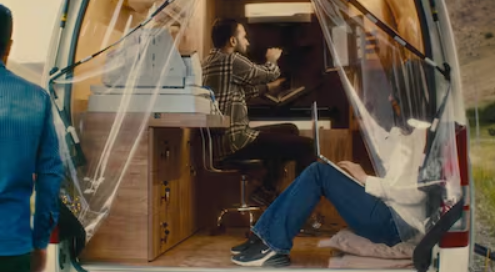In the Kurdistan region of Iraq, a small white van serves as more than just a vehicle—it’s a lifeline for a rich cultural heritage at risk. The van has been transformed into a mobile digitization hub by the Kurdistan Centre for Arts and Culture, a nonprofit based in Erbil.
Equipped with specialized scanners, it travels across the mountainous Kurdistan region, capturing images of literary treasures, documents, photographs, and artworks to help protect a culture that could be lost forever. Fateh Rebar, the center’s public relations manager, explains the mission’s goals.
“We want to preserve Kurdish culture, including archival items and art, and also promote it to an international audience,” he told. The center, established a year ago, launched its digital archive in May, featuring over 2,000 items, including rare manuscripts, magazines, and photographs that showcase life in the Kurdistan region from 1770 to the present.
Initially, many collectors hesitated to share valuable items with a new organization, fearing damage or loss. “We built this van with a vision,” Mr. Rebar said. “You don’t need to give us your books; we come to you, scan them, and return them immediately. It’s quick, convenient, and preserves without disruption.”
A team from the Kurdistan Centre for Arts and Culture scans materials in a village north of Erbil, the capital of Iraq’s Kurdish region.
The center seeks not only items related to Iraqi Kurds but also those from Kurdish-majority areas in Iran, Turkey, and Syria. It also collects books published in other languages—such as Arabic, Ottoman Turkish, Persian, and Russian—that have made their way to the Kurdistan region. “This isn’t just about Kurdish people; it’s about what was in Kurdistan libraries,” he said.
The Kurds represent one of the largest stateless ethnic groups globally, numbering around 30 million across Turkey, Iraq, Iran, and Syria. They speak their language, which includes several dialects.
Denied their own state when colonial powers reshaped the modern Middle East after the Ottoman Empire fell, the Kurds have long sought autonomy or independence, sometimes peacefully and at other times through armed rebellion.
In Iraq, the Kurds have risen against the central government several times throughout the 20th century. In the 1980s, Saddam Hussein accused them of siding with Iran during the Iran-Iraq war. To punish them, he launched a brutal campaign and chemical attacks that killed around 50,000 people.
Following the 1990 Gulf War, the US imposed a no-fly zone, allowing Kurds to enjoy de facto autonomy in northern Iraq and become a close ally of the US. They formalized their autonomy after the 2003 US-led invasion that ousted Saddam, establishing the Kurdish region as a stable area amid post-invasion violence.
“Unfortunately, over the years, we faced torture, killings, and the burning of villages due to chemical attacks,” Mr. Rebar explained. “Not only were people harmed, but mosques, libraries, and universities were destroyed,” he added, noting that some collections had been buried by owners for safekeeping.
The center uses advanced equipment to build its digital archive.
The Kurdistan Centre for Arts and Culture employs state-of-the-art technology found in major global archives, like the Mohammed Bin Rashid Library in Dubai. This allows users to search through scanned text, helping scholars and everyday users locate specific information easily.
“You can type in any word, and it will show where it appears in our collections,” Mr. Rebar explained. “This makes Kurdish resources much more accessible. While libraries in Kurdistan have limited hours, this archive is always open, allowing anyone to access valuable information whenever they need.”
The archive includes religious and grammar books from the 1770s, decrees from the Ottoman period appointing local officials, property deeds, old Kurdish folk tales named after the 16th-century princess Xanzad, Kurdish newspapers, magazines, and photos of notable Kurdish figures.
The process begins by identifying valuable collections to add to the archive, either by contacting well-known collectors or through word of mouth. Then the van, led by Rebeen Hawezy, a data entry specialist and computer technician, hits the road through the hills of Kurdistan. Using the advanced scanners in the van, they digitize centuries-old books, manuscripts, and photographs, ensuring that past stories and knowledge continue in the digital age.
“What we’re doing is very important. Archiving in Kurdistan hasn’t received enough attention. Our work follows international standards,” Mr. Hawezy said.
“The people are supportive; they welcome us and provide everything we need. They appreciate what we do and often get very excited about it.”





